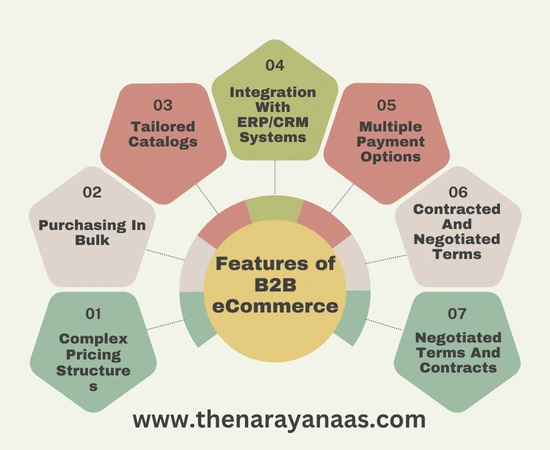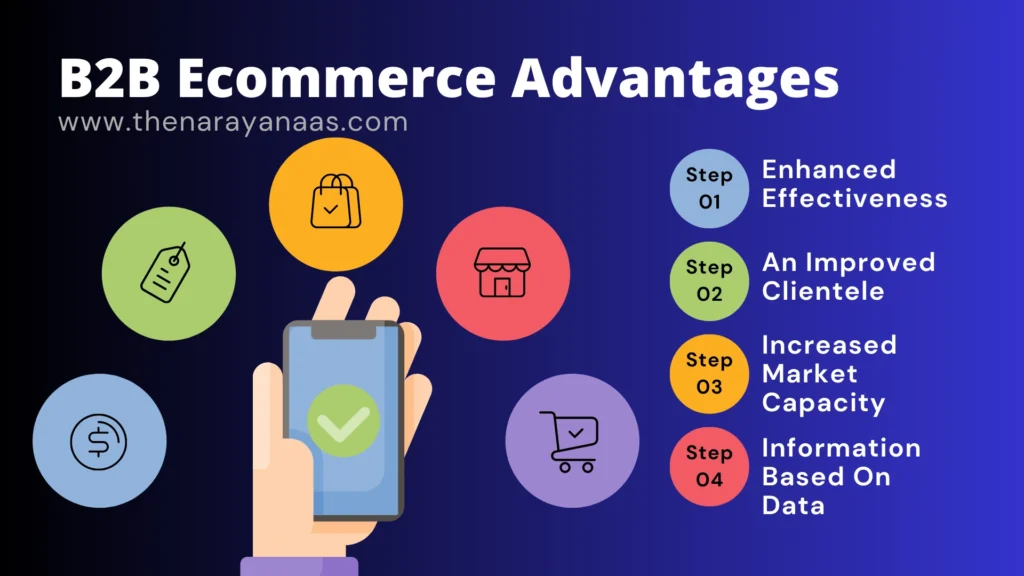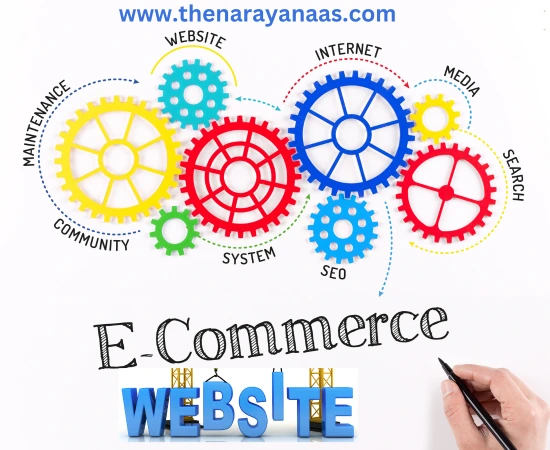The world of traditional commerce has changed in recent years due to the rise of (Business-to-Business) B2B eCommerce platform. These platforms have produced a smooth, digital marketplace where companies may trade goods and services with other companies, increasing productivity, opening up new markets, and cutting expenses. The estimated $12.2 trillion value of the global business-to-business (B2B) eCommerce sector illustrates how essential these platforms have become in today’s business ecosystem. This is over six times the size of the B2C (business-to-consumer) market.
This article will address major platforms on the market, go over the main characteristics, advantages, and difficulties of B2B eCommerce platforms, and show how companies may use these systems to their advantage.
Understanding B2B eCommerce Platform

A digital marketplace where companies conduct direct business with one another is called a B2B eCommerce platform. The complicated needs of business buyers and sellers are met by B2B platforms, as opposed to B2C platforms, which serve individual consumers. These needs may include bulk orders, customized pricing, particular payment conditions, and more.
Important Features of B2B eCommerce Platforms: Intricate Pricing Schemes

- Complex Pricing Structures: Pricing isn’t always clear-cut in the B2B market. Pricing is frequently varied for various consumers depending on things like contract agreements, geographic region, loyalty, and order volume. Businesses can easily manage these intricate pricing structures using a B2B eCommerce platform, guaranteeing that the appropriate prices are shown to the appropriate clients.
- Purchasing In Bulk: Businesses typically make bulk purchases as opposed to B2C customers who make single purchases. Large orders can be handled effectively by B2B systems, which also offer features like product bundling, volume discounts, and wholesale pricing.
- Tailored Catalogs: A lot of B2B eCommerce platforms provide customized catalogs for various customers. Companies can display customized product assortments to customers based on their industry, past purchases, or agreements that have been signed.
Connectivity to ERP and CRM Systems - Integration With ERP/CRM Systems: Integration with Customer Relationship Management (CRM) or Enterprise Resource Planning (ERP) systems is frequently necessary for B2B operations in order to handle inventory, order processing, customer data, and supply chain logistics.
Various Methods of Payment - Multiple Payment Options: In B2B eCommerce platforms, payment methods frequently diverge from those in B2C. With a range of payment methods including purchase orders, invoices, credit terms, bank transfers, and online payment gateways, B2B platforms offer flexibility.
- Contracted And Negotiated Terms: Terms and contract negotiations are supported by B2B eCommerce systems. Within the marketplace, buyers and sellers can bargain over conditions including payment terms, delivery dates, and prices.
Hard Workflows for Approval - Negotiated Terms And Contracts: Approvals for purchases in a business-to-business setting frequently pass through several levels of administration. Through approval workflows created using B2B platforms, companies may ensure that orders are examined and approved by the appropriate decision-makers prior to processing.
The Advantages of B2B eCommerce Platforms

- Enhanced Effectiveness
B2B marketplaces make purchasing easier. Businesses can save time and lower human error by automating order, invoicing, and payment processing in place of manually handling these tasks. - An Improved Clientele
When it comes to convenience, modern B2B customers demand no less than what they receive when they purchase for themselves. Improved client satisfaction is the outcome of B2B systems’ user-friendly interfaces, tailored catalogs, and simple reordering options. - Increased Market Capacity
In the past, direct sales staff and physical presence were essential to B2B sales. Businesses can sell to any firm in the world via eCommerce systems, thereby extending their market reach beyond local borders. - Information Based On Data
Businesses can access useful data on customer purchasing patterns, sales patterns, and inventories through B2B eCommerce systems. By using this data, marketing strategies can be improved, product offerings can be enhanced, and demand forecasting accuracy can be increased. - Saving Money
Business transaction expenses related to manpower, mistakes, and manual order processing are decreased by digitizing transactions. Furthermore, by automating procedures, B2B platforms can reduce operating expenses and increase overall profitability. - Flexibility
Systems that can develop with a firm are essential. B2B eCommerce systems are built to accommodate increasing numbers of goods, clients, and orders while maintaining optimal functionality. - Enhanced Retention Of Customers
B2B eCommerce platforms enable companies create lasting relationships with their clients by offering features like simple reordering, contract pricing, and committed support. These partnerships encourage consumer loyalty and repeat business.
Well-known B2B eCommerce Sites

- Shopify Plus
The straightforward and adaptable B2B eCommerce platform Shopify Plus is well-known for its great scalability. Shopify Plus’s strong API and integration features allow companies to tailor it to the intricate requirements of business-to-business transactions. Features like multi-channel sales, personalized checkout processes, and bulk pricing are available. - Magento Commerce
Because of its adaptability and extensive customization options, Magento is one of the most widely used B2B eCommerce platforms. It works smoothly with ERP and CRM systems and offers complex pricing models and customizable catalogs. For companies who want to customize every element of their online store, Magento is perfect. - Big Commerce
BigCommerce is a well-known B2B eCommerce platform that serves enterprise-level businesses. BigCommerce provides customizable product administration, bespoke pricing, and multi-storefront management with its sophisticated API and integration features. Additionally, it accepts a number of payment options, such as credit cards and purchase orders. - Oro Commerce
Oro Commerce was created especially with B2B businesses in mind. It provides extensive capabilities to manage multi-channel operations, intricate workflows, and personalized pricing. It is a great option for businesses wishing to automate and optimize their B2B operations because of its robust interface with ERP and CRM systems. - SAP Commerce Cloud
SAP Commerce Cloud is an enterprise-level B2B platform built for large companies with complex requirements. It has strong connection with SAP’s business software package, a plethora of customization choices, and features including contract negotiations, ordering in quantity, and setting prices according to the needs of each individual customer.
Obstacles B2B eCommerce Platforms Face
Although B2B eCommerce platforms have many benefits, they also have certain drawbacks.

- Complicated Purchase Requirements
B2B purchasers frequently have particular needs, like negotiated pricing, volume sales, and customized products. Meeting these demands necessitates a very adaptable platform, which can be difficult for companies to set up and run efficiently. - Convergence With Historical Systems
Legacy systems are used by many firms to manage orders, inventory, and customer relations. It can be difficult and expensive to integrate these systems with contemporary B2B platforms, necessitating a large investment in IT infrastructure. - Security Of Data
Sensitive data, such as contracts, financial information, and private business data, is frequently exchanged in business-to-business interactions. Data security is of utmost importance, and any compromise might have dire repercussions for consumers and sellers alike. - Management Of Change
The firm must undergo a cultural transformation in order to move from traditional sales approaches to digital platforms. In the early stages of adoption, managing client expectations, implementing new procedures, and training staff can all be difficult tasks. - Sustaining Connections With Customers
Businesses sometimes worry about losing personal relationships with their consumers when implementing B2B eCommerce platforms. Long-lasting relationships are frequently formed by direct sales teams, so switching to a digital platform can feel impersonal. Nevertheless, this difficulty can be lessened by incorporating CRM technologies and providing excellent customer service.
Important Things to Look for in a B2B eCommerce Platform
When choosing a B2B eCommerce platform, companies need to consider a number of important aspects:
- Scalability: As your business expands, be sure the platform can accommodate the rising volume of customers, goods, and traffic.
- Customization: Seek systems that have the ability to alter user interfaces, pricing structures, and catalogs.
- Integration: Select a platform that works well with the business software, ERP, and CRM that you currently have in place.
- Security: Verify that the platform has robust security features, such as data backups, encryption, and adherence to industry standards.
- User Experience: Your internal staff and your clients should both find the platform to be simple to use and intuitive.
- Support And Maintenance: To prevent interruptions, choose a platform that offers continuous technical support, frequent upgrades, and maintenance.
In summary
Platforms for B2B eCommerce have grown to be indispensable for contemporary companies. Their capacity to access a global market, efficiency, and scalability make them essential for any business hoping to remain competitive in the current digital landscape. But selecting the appropriate platform, guaranteeing a smooth interface with current systems, and cultivating enduring client relationships through tailored support and service are all essential to success.
B2B eCommerce has the potential to revolutionize business-to-business transactions by promoting stronger collaborations and growth through appropriate strategy and platform selection. B2B businesses that use eCommerce will be better equipped to handle future demands as the digital revolution progresses.
What is the difference between a B2B and a B2C eCommerce platform?
Platforms for business-to-business (B2B) eCommerce are made to meet the demands of companies that offer goods or services to other companies. These platforms come with features like multi-user account management, configurable catalogs, intricate pricing structures, and bulk ordering. B2C (Business-to-Consumer) platforms, on the other hand, cater to individual consumers and offer more plain pricing structures, simpler interfaces, and a more efficient user experience for personal purchases.
What are the key factors to consider when choosing a B2B eCommerce platform?
Scalability (to accommodate company expansion), customization (to satisfy particular client and business demands), integration capabilities (with ERP, CRM, and other systems), security (to safeguard confidential company information), and user experience (for external and internal users) are important components. For operations to run smoothly, dependable customer service and frequent updates are also essential.


[…] something you’ve thought about if you’re a company looking to grow, create leads, and scale your operations. This blog post will go into great detail on the benefits of working with a B2B digital marketing […]